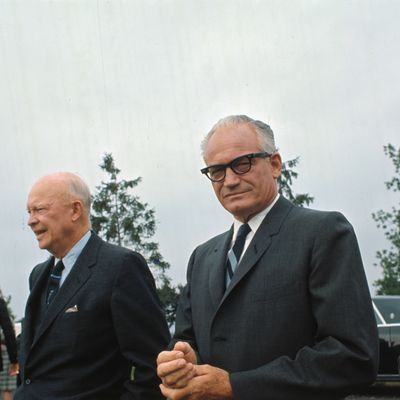
The quick and almost complete accommodation of the Republican Party to a hostile takeover by Donald J. Trump is justly a major source of perpetual discussion. It has certainly made Tim Alberta’s new book on this subject, American Carnage, a must-read for political observers of all persuasions.
Now comes an argument for the proposition that there was nothing at all odd about this accommodation, based on the precedent of elite Republican acceptance of an equally disruptive figure, Barry Goldwater, in 1964. At that time, moderate Republicans, led by former president Dwight D. Eisenhower, swallowed their misgivings about the very conservative Arizonan and put their shoulders to his wheel out of a sense of partisan and (on most issues) ideological solidarity. Or so argues Cornell historian Lawrence Glickman in a Washington Post column mostly focused on retailing Ike’s many deeds and words in support of a radical Republican nominee who once denounced his administration as a “dime-store New Deal.”
Like Ike and other moderate Republicans (notably Goldwater’s primary rival Nelson Rockefeller) of their day, says Glickman, the “never-Trump Republicans” of 2016 gradually came around once they decided it was prudent to take what they could get from the mogul and swallow as their medicine the things that made him a “populist” figure:
This reality helps explain why Never Trumpers are now endorsing the president. They, too, have been assailed for lacking courage or principles. But the declining opposition is less about a paucity of moral courage and more about a lack of sufficient disagreement. Trump may have been a controversial candidate — and he remains so as president — but his governing agenda has largely pleased conservatives.
There’s nothing I love more than a provocative hypothesis based on a careful reading of political history. But there’s a glaring hole in Glickman’s analogy. Barry Goldwater never had the opportunity to advance a “governing agenda.” He was pretty much DOA as a presidential nominee. Had he somehow won, then you’d have a clear ground for comparison. But as it is, you can argue plausibly that moderate-Republican acceptance of Goldwater (and it was far from universal) was based on a desire to get rid of him gracefully and then reconquer the party on behalf of a Republican Establishment that he and his zealous supporters had temporarily defeated.
Yes, a lot of Republicans thought Trump was a sure loser, too, when he won the GOP nomination. But not a loser like Goldwater was destined to be. Lyndon Johnson’s job-approval rating never dropped below 70 percent in the Gallup poll between the time he became president upon JFK’s assassination in November 1963 and his reelection in November 1964. In Gallup’s 1964 general-election trial heats, Goldwater never got closer than 28 points to LBJ.
Eisenhower was the only Republican president to have taken office since Hoover; of course he was not inclined to handicap his party’s hapless nominee even further. And other “moderate” endorsers like Rockefeller and Richard Nixon were confidently planning to inherit the GOP after Goldwater’s defeat and naturally didn’t want to become vulnerable to allegations of disloyalty. Nobody knew then that Goldwater would be remembered as one of the founders of the eventually triumphant conservative movement. That whole mythology didn’t emerge as conventional wisdom until Ronald Reagan, the B-movie actor who campaigned for Barry, won the GOP nomination and then the presidency 16 years later.
By contrast, in 2016, once he clinched the nomination, Trump never trailed Hillary Clinton in the RealClearPolitics polling averages by more than seven points and change. Ted Cruz’s refusal to endorse Trump at the Republican convention was a sensation because it stood out as so unusual. Only when it looked like Trump had finally disqualified himself as the Access Hollywood tapes came out did underlying fears that the nominee would taint the party forever create a Republican revolt, which disappeared the moment polls showed it hadn’t hurt him at all. But any real support for Trump from party elites only developed in the wake of his shocking victory.
Alberta’s book perfectly illustrated the moment of convergence as it appeared from the perspective of House Speaker Paul Ryan on Election Day itself:
With members of the national media assemble in Janesville, he would give a speech blasting Trump and turning the page on a dark chapter in GOP history … Ryan would be its leader for another our years, and a top priority would be erasing the remnants of Trumpism.
Then the returns came in.
After, ironically, Ryan’s own state put Trump over the top, the Speaker quickly pivoted to an effort to take advantage of a Republican governing trifecta to enact the conservative policy agenda he had been promoting for years. And that’s when most other Republicans fell in line, too, and began swallowing the elements of Trump’s “governing agenda” that had previously offended them.
Goldwater had to wait decades for his vindication. Trump just needed one shocking Election Day. Politicians like winning. And they like being able to share in the spoils of victory even more. Yes, you can clearly demonstrate, as Alberta does, that Trump’s rise was foreshadowed by a deep tradition of Republican white identity politics and extremism (some of it associated with the Goldwater campaign), and more immediately by the anti-Obama, anti-Establishment right-wing “populism” of the tea-party movement. But Trumpism, conservatism, and Republicanism came together in a rush of sheer power and the thrill of opportunism. “Never Trump” Republicans never had a chance, and mostly took their place at the patronage trough like everyone else.






























